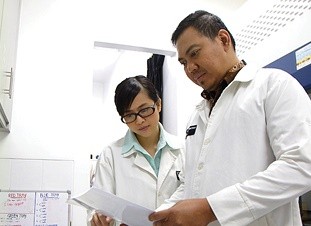Popular Reads
Top Results
Can't find what you're looking for?
View all search resultsPopular Reads
Top Results
Can't find what you're looking for?
View all search resultsKalbe Farma sales underwhelm investors
Change text size
Gift Premium Articles
to Anyone
P
T Kalbe Farma, a leading Indonesian pharmaceutical group, has reported net sales of Rp 6.015 trillion (US$421 million) in the first quarter of 2021, marking a year-on-year increase of 3.8 percent and failing to impress investors.
At a press conference on Thursday, the group expressed optimism and projected an annual increase of 5 to 6 percent in both sales and net profit, resting its hopes, in large part, on business related to the COVID-19 pandemic.
“Based on the developments in the first quarter […], we are confident that we can grow beyond our current projection. However, we’re still waiting for the numbers for the first half of 2021,” said Bernadus Karmin Winata, finance and accounting head of PT Kalbe Farma.
Shares of the publicly listed company fell 2.7 percent on Thursday and had changed little as of midday on Friday.
Bernadus said he believed Kalbe Farma’s participation in Indonesia’s COVID-19 response, such as through the manufacture of laboratory diagnostic tools and therapeutic and preventive products, would buoy growth.
He added that the drop in hospitalized COVID-19 patients would increase people’s willingness to be admitted to the hospital for non-COVID-19 treatment, which would contribute to the company’s sales going forward. However, he noted that it was important for the group to create new and affordable products to retain its current growth.
The group has allocated Rp 1 trillion for capital expenditure in 2021. As of the first quarter, only Rp 110 billion of those funds had been spent, going mostly toward capital maintenance, such as replacing old vehicles and renovating warehouses.
The total operating expenses of the group dropped 5.2 percent year-on-year (yoy) to Rp 1.314 trillion in the first quarter.
The group is working with Genexine South Korea to produce a DNA-based COVID-19 vaccine. The vaccine is in the clinical phase after being developed in South Korea. Kalbe Farma has allocated between Rp 100 billion and 150 billion for vaccine trials and expects to start phases two and three of the trials in the second half of the year. Assuming the permit process runs smoothly, the company hopes to have the vaccine approved for emergency use before the end of the year.
The group is also investing in the production of pharmaceutical products based on locally cultivated commodities, such as red ginger. Kalbe Farma president director Vidjongtius said around Rp 50 billion would be used for the project this year.
The company’s first-quarter financial statement shows an increase of Rp 74 billion in research and development expenses, up 9.65 percent yoy.
While Indonesia’s GDP contracted 0.74 percent yoy in the first quarter, the chemical, pharmaceutical and traditional medicine manufacturing sector grew 11.46 percent in the same period after receiving a boost from the pandemic response effort.










